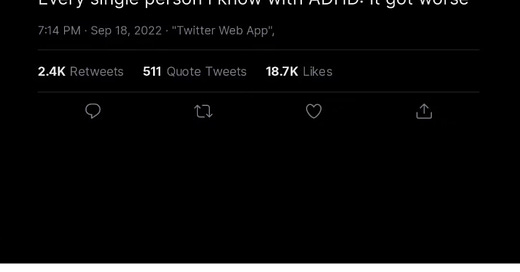This month marks two years that I’ve been treating my ADHD with medication. Talking about taking medication for ADHD still feels like someone might catch the ick even though I’m a therapist with ADHD who treats people with ADHD. Stimulants have an abuse potential when in the wrong hands so I’ve hesitated to share my experience with people outside of my circle. But ADHD is one of those conditions that responds beautifully and quickly to medication so we need to make sure we’re talking about it.
When I decided to pursue medication (in late 2020) I was at a point where I knew things were becoming more unmanageable than I was comfortable with, despite being someone who thrives on having bitten off a little more than I can chew most of the time. My business was rapidly growing and keeping the life ship afloat in general was getting harder. ADHD isn’t a condition that just makes it hard for you to focus; it’s a neurological condition that makes it hard for you to regulate just about everything- emotions, attention, motivation, focus etc.
Up until that point I was doing alright managing my symptoms on my own because I hadn’t known anything else. I’d already overhauled all the lifestyle changes I help my clients make to support my unique neurodivergence and I put as many systems in place as I could to cushion myself. But as things continued to pile onto my plate, nothing was coming off. The mental load of having three kids was getting heavier in new ways and the clinician in me was recognizing signs that showed me it was time to explore a new support that I hadn’t yet- meds.
And to be super clear I was never opposed to this before, but for a long stretch of time I was either trying to get pregnant, pregnant, or breastfeeding so the thought of trying a stimulant, getting adjusted to it and then having to go off of it was overwhelming. I eventually just kind of forgot it was an option (ha, yes the irony).
The Goal
My main goal with meds was managing what always felt like chaos in my brain. Keep in mind an ADHD brain is actually underactive and it doesn’t send the appropriate messages back and forth to the correct areas of the brain (due to abnormally low levels of a couple of key neurotransmitters). But it feels like everything in my brain goes very fast because without enough of the right neurotransmitters there’s nothing there to control all the messaging, so it feels like chaos. Think of a really busy intersection without traffic lights- the cars keep going in all different directions and crashing into each other, preventing anyone from getting to where they need to go because there isn’t anyone there to direct traffic. It’s mayhem 24/7.
I needed help managing the sheer speed and volume of thoughts, ideas, and inner monologue conversations that occur simultaneously on top of the songs that play on loop. ALL WHILE I pursue endless side quests and hyper-fixations while trying to run a business and take care of three children…because all of that was (is) exhausting. And even though there were specific parts of my day I could harness my focus when I was highly engaged in what I was doing, in general my brain made it very hard for me to move the needle forward on any goals I had professionally.
As my kids got older the physical demands of motherhood eased up immensely but the emotional demands cranked up, and I noticed it was really taxing my already shaky ability to regulate my own emotions.
The good news is that two years later, medication has helped with ALL of these things. Some more than others. I’ve had dose adjustments, brand changes and more check ins with my doctor than I care to revisit. But overall, I’m so happy with the support it’s provided. I’ve also been so surprised, as the patient and not the clinician, at what the experience has been like to be totally honest.





